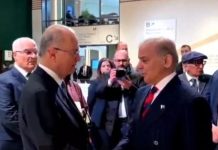From Tehmina Mustapha
TEHRAN: Iran told the United Arab Emirates that Tehran gave a high priority to improving ties with its neighbours, Iranian state media reported, a day after the UAE voiced concern over Tehran’s nuclear programme.
The UAE’s envoy at the United Nations’ nuclear watchdog on Friday said he hoped Iran would work with the body to provide reassurances to the international community and the region about Tehran’s nuclear programme.
In a phone call with his UAE counterpart, Iranian Foreign Minister Hossein Amirabdollahian “pointed to the priority of neighbours in Iran’s foreign policy and called for more consultation to expand bilateral ties,” state media said.
Indirect talks between Tehran and Washington to revive a 2015 nuclear deal have stalled since March and Tehran has restricted the International Atomic Energy Agency’s ability to monitor the Iranian nuclear programme after a dispute with the UN watchdog. The United Arab Emirates urged Iran on Friday to provide reassurances on the peaceful nature of its nuclear programme after the International Atomic Energy Agency denounced Tehran’s lack of cooperation. “There are concerns,” said the permanent representative of the UAE to the IAEA, Hamad Al Kaabi.
In response to a question during a press conference on the Emirates’ own nuclear programme, he called on Iran to “closely cooperate with the IAEA” and “provide reassurances to regional and international countries regarding the peacefulness of its nuclear programme”.
The UAE has the first nuclear power plant in the Arab world. It lies just across the Gulf from Iran which has a nuclear power plant of its own outside the coastal city of Bushehr, as well as a controversial uranium enrichment programme.
Kaabi’s statements come after Iran disconnected some IAEA cameras monitoring its nuclear sites this month, shortly after the US and its European allies pushed through a resolution at the UN agency denouncing Tehran’s lack of cooperation.
A 2015 deal with world powers gave Iran relief from sanctions in return for guarantees that it could not develop a nuclear weapon — something Tehran has always denied wanting to do.
The United States unilaterally withdrew from the nuclear agreement in 2018 under then-president Donald Trump, before imposing biting sanctions on the Islamic republic. Iran in turn began reneging on its own commitments.
US President Joe Biden has said he is ready to again embrace the deal so long as Iran also respects its own pledges under it.
Washington’s Secretary of State Antony Blinken in April said the “breakout time” for Iran to develop a nuclear bomb, if it so chooses, is “down to a matter of weeks” after the deal had pushed it beyond a year.
The UAE has repeatedly said its nuclear ambitions are for “peaceful purposes” and has ruled out developing any enrichment programme or nuclear reprocessing technologies.
It has also moved to dispel any concerns over safety, underlining that the plant has welcomed more than 40 international reviews and inspection missions.
Indirect talks between Tehran and Washington to revive a 2015 nuclear deal have stalled since March and Tehran has restricted the International Atomic Energy Agency’s ability to monitor the Iranian nuclear programme after a dispute with the UN watchdog.
The United Arab Emirates urged Iran on Friday to provide reassurances on the peaceful nature of its nuclear programme after the International Atomic Energy Agency denounced Tehran’s lack of cooperation.
“There are concerns,” said the permanent representative of the UAE to the IAEA, Hamad Al Kaabi.




